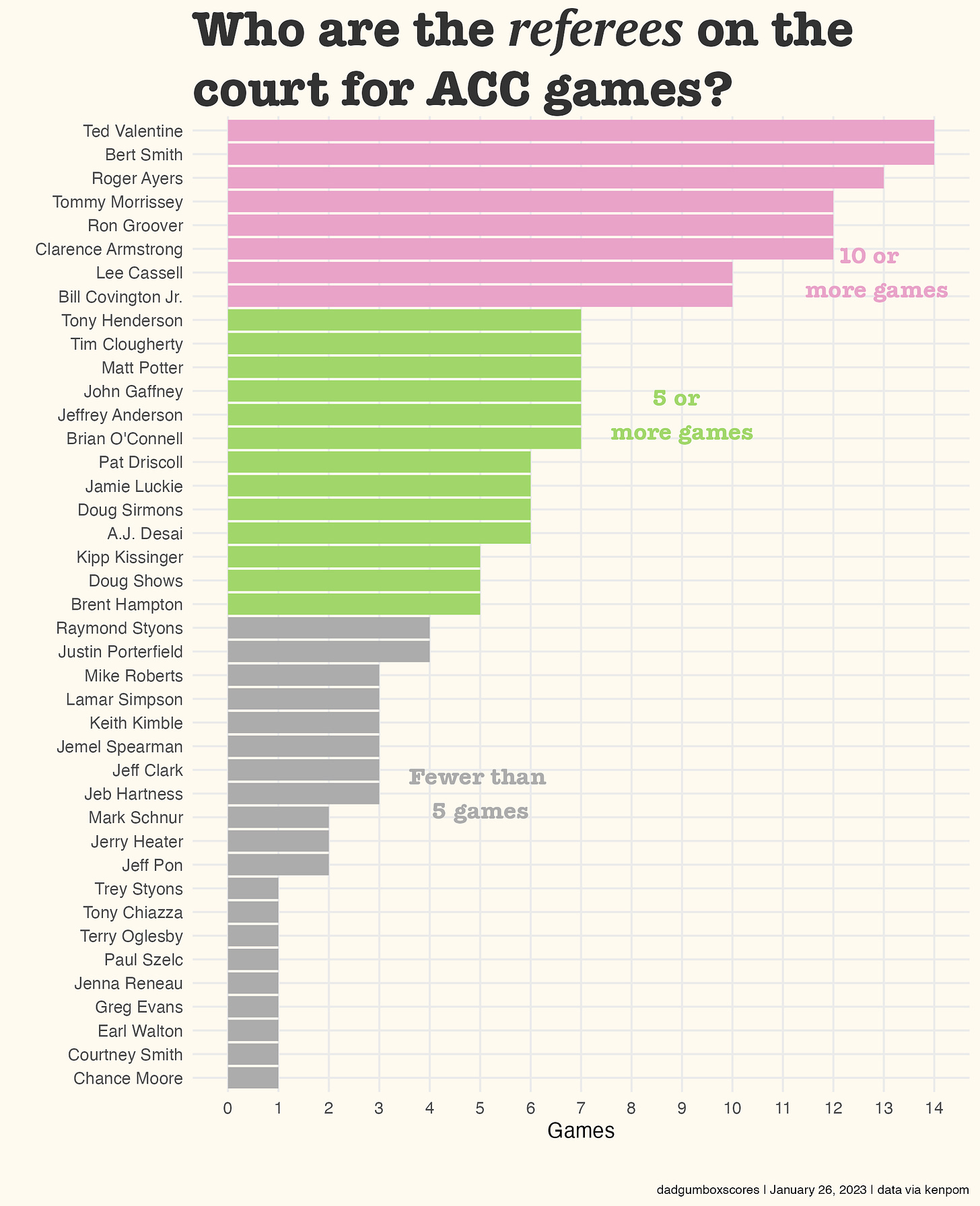013: 🏀 ACC Refs
A look at who refs ACC men's basketball games and thoughts on how to "rate" refs.
ACC officials are having a moment.
The goal of this post is to answer two questions:
Who are the officials on the court for ACC games?
How do you “rate” refs?
ACC refs
Public data on collegiate officials is limited. Data or stat providers list out the officials in box scores. It’s more metadata on the game, and not often aggregated.
Ken Pomeroy introduced ref ratings in 2017. This is the data we’re using to compile which officials are on the court for ACC games.
Notes on the refs that have worked the most games:
Bert Smith and Ted Valentine have been on the court more than any other official for ACC league games.
Smith, who had a scary moment in the 2021 Final Four, has officiated 14 league games so far. This is about a quarter of his 58 total officiated games in the 2022-23 season. He has been the ref in five N.C. State games, four ACC games and the Kansas game.
TV Teddy needs no introduction. Valentine worked the 1991 Final Four. That’s not a typo. 14 of Valentine’s 43 games are from league games this season.
Roger Ayers has worked 60 games this season. 13 of those 60 have come in ACC play, including the go-to-the-monitor-to-change-the-call-to-a-flagrant-1 in the Syracuse/UNC game. (Imagine lots of 78 year olds react to news this way)
Not sure I would trust Tommy Morrissey to officiate a wedding after watching this block/charge call. Morrissey was on the court for the latest Carolina/State debacle. He has officiated 46 games this season, including a busy schedule last week that featured five games in six days in these locations:
Monday in Wilmington, NC
Tuesday in South Bend, IN
Wednesday in St. Bonaventure, NY
Friday in Riverdale, NY
Saturday in Chapel Hill, NC
Ref Ratings?
Rating collegiate refs is tricky for a lot of reasons. There is little public information and a lack of transparency across conferences and the NCAA.
It’s not the NFL. You can find officials with a log of games and the penalties broken down by type for that league.
Ken Pomeroy has taken a shot at rating refs. It’s not perfect, but at least it’s something to disagree with or question. Pomeroy operates under the assumption that the best officials get assigned to the best games.
What this means is Pomeroy uses the Thrill Score that captures both opponent quality and competitiveness of the game. He takes the average Thrill Score over the top 50 games for an official, and uses that as a rating.
Here is an attempt at that same methodology for a sample of officials that have also worked ACC games, where the ACC Rating is the average Thrill Score of those league games.
Notes:
Keith Kimble is the top official across all of college basketball in these ratings. Kimble has worked six Big 12 games this season, and that conference is the most competitive by Pomeroy’s ratings, so it makes sense it floats him to the top of the leaderboard.
Three refs - Tommy Morrissey, Bill Covington Jr., and Ted Valentine - all rank 46th or worse in Pomeroy’s ratings. All have worked double-digit ACC games.
John Higgins, the third rated official in kenpom ratings, has not been on the court for any ACC games this season. Higgins was involved in the UNC/Kentucky Elite 8 game in 2017. He has worked six Big 12 games and four Big Ten games, both competitive conferences, that help his overall rating.
If the best officials get the best games, and the ACC is the sixth best conference in the country according to Pomeroy, does that mean the ACC has bad officials?
We live in a time where if you want to believe something, it takes little effort to find information to support that belief.
No, I don’t believe this means the ACC has bad officials.
The job of a referee is hard. Collegiate officials are not full-time employees. The travel schedules are alarming, especially because these officials are not young. And we often forget, myself included, that refs are human. Mistakes happen.
The sport itself struggles with change. It doesn’t play quarters like the women’s game or every other organized basketball league. The NET might be better than the RPI, but why is a quadrant a moving target?
We can go to the monitor, but are we sure adding technology has helped make officiating more accurate? Has the flop rule improved the game or made it worse?
I think it’s fair to say ACC officiating feels inconsistent this season. From week to week, game to game, even whistle to whistle. Some calls feel wrong, but the calls feel wrong in different ways.
But that’s feel. It’s not concrete.
I imagine a proper way to rate officials is by charting the games, grading each whistle or non-whistle, and sharing that information. I do think someone grades officials, but I imagine the incentives are not there to share that information. Maybe if refs were full-time employees?
Imagine if that information was shared, would it change the narrative?
Thanks to hoopR for making it easier to fetch data, and see the code for the charts here. Make sure you subscribe to kenpom too. And if you find any errors, please let me know.
Shoutout Martin Rickman, tried to squeeze in a #goacc reference, and please join me in trying to remember that refs are human.




Sorry official's in the Carolina/Duke game especially Ted Valentine he needs to be banned from acc basketball games